Dr Fahmida Khatun
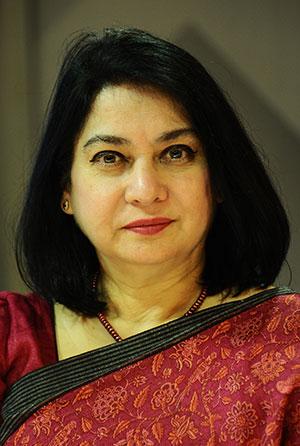
Dr Fahmida Khatun
Executive Director
Centre for Policy Dialogue (CPD)
Phone: (+88 02) 55001184
Expertise and Interest
Macroeconomic policy, climate change, environment, energy economics, green economy, international development financeaid effectiveness, international trade and WTO issues, digital economy, youth employment, health issues, interests of Least Developed Countries (LDCs), Sustainable Development Goals (SDGs), and women’s contribution to the economy
Dr Fahmida Khatun is the Executive Director of the Centre for Policy Dialogue (CPD), a leading think tank in Bangladesh and South Asia. Dr Khatun is also a Non-resident Senior Fellow at the Atlantic Council, think tank based in the USA (https://www.atlanticcouncil.org/expert/fahmida-khatun/).
She has done PhD in Economics from UCL, University of London UK. She did her post-doctoral research at Columbia University, USA as a Fulbright Scholar. At Colombia University she undertook joint research with Professor Jeffery Sachs. She has also participated in a Leadership Decision Making programme at Harvard University, USA.
During December 2022-December 2023, Dr Khatun served as the Co-Chair of T20 India Task Force on “Accelerating SDGs: Exploring New Pathways to the 2030 Agenda” to the G20. She is a member of the High-level Advisory Board on Productive Capacities Index (PCI) of United Nations Conference on Trade and Development (UNCTAD). She is a member of the Governing Body of BRAC, largest non-government organisation in the world working for the cause of the poor and left behind.
Prior to joining CPD she worked as a Research Fellow at the Bangladesh Institute of Development Studies (BIDS); as an Environment Specialist for the UNDP; as an Economist for the USAID Mission in Bangladesh. She taught economics at universities in Bangladesh and England. She was a Visiting Fellow at the Christian Michelsen Institute (CMI), Norway, at the Center for Study of Science, Technology and Policy (CSTEP), India, and at the Korea Institute for Industrial Economics and Trade (KIIET), South Korea. She is a member of the editorial board of Indian Journal of Human Development (JHD).
Dr Khatun was a member of the Panel of Economists for the Eighth Five Year Plan (2021-25) formed by Bangladesh Planning Commission. She served as a member of the Advisory Committee for the National Human Development Report prepared by the Economic Relations Division, Government of Bangladesh. She was a Director of Janata Bank Limited, the second largest state-owned bank of Bangladesh (2008-2011) and a Director of the SME Foundation of Bangladesh (2011-2013).
Dr Khatun’s research interests and expertise include macroeconomic policy, climate change, environment, energy economics, green economy, aid effectiveness, international trade and WTO issues, digital economy, youth employment, health issues, interests of Least Developed Countries (LDCs), Sustainable Development Goals (SDGs), and women’s contribution to the economy.
She delivers lectures on economic issues at several reputed institutions in Bangladesh. The pre-eminent ones include public and private universities, National Defence College, Defence Services and Staff College, Bangladesh Police Academy, and Bangladesh Public Administration Training Centre.
She has published widely at home and abroad. She is a columnist of the Daily Star, a leading daily in Bangladesh (www.thedailystar.net/author/dr-fahmida-khatun). She is also a contributor to the East Asia Forum (www.eastasiaforum.org/index.php?s=fahmida+khatun). Dr Khatun hosted popular talk shows in the national televisions on economic issues. She was a regular contributor to BBC Bangla at BBC World Service during 1991-96 in London. Dr. Khatun regularly speaks on economic issues in the national and international media including The Econmist, BBC World Service Television and Radio, Voice of America Radio, and Al-Jazeera Television.
Selected Publications (as of 4 February 2024)
Books
Khatun, F., Saadat, S.Y., Ashraf, K. & Mahbub, A. (2023) Bangladesh-Japan Partnership for the Next Development Journey.
https://cpd.org.bd/publication/bangladesh-japan-partnership-the-next-development-journey/
Khatun, F., Saadat, S. Y., Ashraf, K., & Taki, M. A. T. (2022). Skills Gap and Youth Employment in Bangladesh: An Exploratory Analysis. Dhaka: Centre for Policy Dialogue (CPD) and Friedrich-Ebert-Stiftung (FES) Bangladesh.
https://cpd.org.bd/publication/skills-gap-and-youth-employment-in-bangladesh/
Khatun, F. & Saadat, S.Y (2020). Youth Employment in Bangladesh: Creating Opportunities Reaping Dividends. Palgrave Macmillan.
Khatun, F., Bhattacharya, D., Rahman, M., Moazzem, K.G., Khan, T.I., Sabbih, M.A. and Saadat, S.Y. (2020). Four Years of SDGs in Bangladesh: Measuring Progress and Charting the Path Forward. Dhaka: Centre for Policy Dialogue (CPD) and Citizen’s Platform for SDGs, Bangladesh.
Khatun, F (2018). The Ignored Generation: Exploring the Dynamics of Youth Employment in Bangladesh (co-authored with Syed Yusuf Saadat). Dhaka: Centre for Policy Dialogue (CPD) and Citizen’s Platform for SDGs, Bangladesh. https://cpd.org.bd/the-ignored-generationexploring-the-dynamics-of-youth-employment-in-bangladesh/
Khatun, F. (2015). Estimating Women’s Contribution to the Economy: The Case of Bangladesh (coauthored with Towfiqul Islam Khan, Shahida Pervin and Hosna Jahan). Centre for Policy Dialogue. December 2015. https://cpd.org.bd/estimating-womens-contribution-to-theeconomy-the-case-of-bangladesh/
Khatun, F. (2014). বাংলাদেশের অর্থনীতি: ভিতর ও বাহির (in Bangla language) (Bangladesh’s Economy: Inside and Outside), Dhaka: Centre for Policy Dialogue (CPD) and Agamee Prakashani.
Book Chapters
Khatun, F. & Saadat, S.Y. SDG Implementation in Bangladesh: Domestic Challenges and Regional Considerations. In Bhattacharya, D. & Kumar, N. (Eds.) Interpreting SDGs for South Asia: In Search of a Regional Framework. Springer. [Forthcoming].
Khatun, F. (2022). Issues for Bangladesh. In Mathur, V. & Roy, A. (Eds.) Towards a Low-Carbon and Climate Resilient World: Expectations from COP26. Special Report No. 165. Observer Research Foundation (ORF). https://www.orfonline.org/wp-content/uploads/2021/11/ORF_SpecialReport_165_Expectations-COP26.pdf
Khatun, F. (2022). Chapter on the Economy. In Ahmed, I. (Eds.) Bangladesh Foreign Policypaedia (Volume 10): Engendering Foreign Policy. Centre for Genocide Studies, University of Dhaka.
Khatun, F. & Saadat, S.Y. (2020). Role of Social Protection in Ensuring Inclusive Growth. In Muqtada, M. (Eds.) Quest for Inclusive Growth in Bangladesh: An Employment-focused Strategy. Springer. https://doi.org/10.1007/978-981-15-7614-0
Khatun, F. & Muqtada, M. (2020). The Quest for an Inclusive Growth Strategy. In Muqtada, M. (Eds.) Quest for Inclusive Growth in Bangladesh: An Employment-focused Strategy. Springer. https://doi.org/10.1007/978-981-15-7614-0
Khatun, F. (2019). ‘Social Science Research and TTI: Bangladesh’, Chapter 16, in Strengthening Policy Research: Role of Think Tank Initiative in South Asia, edited by Sukhadeo Thorat, Ajay Dixit and Samar Verma, pp 225 – 235. Sage Publications India Pvt. Ltd
Khatun, F. (2019). ‘Centre for Policy Dialogue’, Chapter 3 in Strengthening Policy Research: Role of Think Tank Initiative in South Asia, edited by Sukhadeo Thorat, Ajay Dixit and Samar Verma, pp 42-56. Sage Publications India Pvt. Ltd
Khatun F, Shahida, P. and Rahman, M. (2018). Bangladesh’s pursuit of the 2030 Agenda: will it facilitate smooth graduation? In Bangladesh’s Graduation from the Least Developed Countries Group: Pitfalls and Promises. London: Routledge.
Khatun, F. (2016); ‘Development Policies since Independence’, in Routledge Handbook of Contemporary Bangladesh, published by Routledge | Taylor & Francis Group. https://www.routledge.com/Routledge-Handbook-of-Contemporary-Bangladesh/RiazRahman/p/book/9780415734615
Khatun, F. and Amin, M. A. (2016); “Carbon Emission, Energy Consumption, Deforestation and Agricultural Income in LDCs: Lessons for Post-2015 Development Agenda;” In Southern Perspectives on the Post-2015 International Development Agenda. London and New York: Routledge.
Khatun, F. (2016); “ICT & Financial Inclusion;” In ICT & SDGs: How Information and Communications Technology can Accelerate Action on the Sustainable Development Goals. New York: The Earth Institute, Columbia University and Ericsson.
http://www.ericsson.com/res/docs/2015/ict-and-sdg-interim-report.pdf
Khatun, F. (2016). [Thematic contributor for the report] State of the Least Developed Countries 2016: Coherence and Synergies between the IPoA and the 2030 Agenda. New York: United Nations Office of the High Representative for the Least Developed Countries, Landlocked Developing Countries and Small Island Developing States (UN-OHRLLS). http://unohrlls.org/customcontent/uploads/2016/08/State-of-LDCs2016.pdf
Khatun, F. and Ahamad, M. (2014); “ODA to and External Debt in LDCs: Recent Trends;” In Istanbul Programme of Action for the LDCs (2011–2020): Monitoring Deliverables, Tracking Progress – Analytical Perspective. London: Commonwealth Secretariat.
Khatun, F. and Hossain, S. (2014); “India’s Economic Rise: Implications for Bangladesh;” In Joseph, M; and Jacob, H. (Eds.) India’s Economic Growth: Opportunities and Challenges for the Region [Australia India Institute Foreign Policy Series 5]. New Delhi: Australia India Institute (University of Melbourne), Regional Centre for Strategic Studies (Colombo) and Manohar Publishers.
Khatun, F. (2012); “A Regional Outlook for Climate Finance in South Asia;” In Bhattacharya, D; and Rahman, M. (eds.) Global Recovery, New Risks and Sustainable Growth: Repositioning South Asia. Dhaka: Centre for Policy Dialogue.
Khatun, F. (2012); “WTO negotiations on environmental goods and services: South Asia’s interests”; In Kelegama, S., Adhikari, R., Sharma, P. and Kharel, P. (eds.) Regional Economic Integration: Challenges for South Asia during Turbulent Times. Kathmandu: South Asia Watch on Trade, Economics and Environment (SAWTEE) and South Asia Centre for Policy Studies (SACEPS), pp 253-268.
Khatun, F (2009); “Migrant labour and remittances in Bangladesh”, in: Stoler, A; L;, J; Redden and L. A. Jackson. Trade and Poverty Reduction in the Asia-pacific Region: Case Studies and Lessons from Low-income Communities. Cambridge: Cambridge University Press, 2009. pp 513-539.
Khatun, F;, K; M; Rahman and A; Nabi (2009); “100 Day Employment Generation Programme in Bangladesh: Challenges of Effective Implementation”, in Development of Bangladesh with Equity and Justice, June 2009, Centre for Policy Dialogue, Dhaka.
Khatun, F (2008); “Environmental Problems and Challenges for Sustainable Development in Bangladesh”, in Independent Review of Bangladesh Economy, University Press Limited, Dhaka.
Khatun, F (various issues since 2002) (co-author). Independent Review of the Bangladesh Economy (co-author), Centre for Policy Dialogue, Dhaka.
Khatun, F and K. G. Moazzem (2008); “Minimum Wage for the Workers in the Ready Made Garments Workers” in Ready Made Garments of Bangladesh during the Quota Free World of Bangladesh during the Quota Free World , (bangla book), Centre for Policy Dialogue, February 2008.
Khatun, F., M Rahman;, D Bhattacharya and K G Moazzem (2008); “Trade Liberalisation and Female Workers: Experience of the Ready Made Garments Industry in Bangladesh” in Ready Made Garments of Bangladesh during the Quota Free World of Bangladesh during the Quota Free World, (bangla book), Centre for Policy Dialogue, Dhaka, February 2008.
Khatun, F (2007); “Bangladesh in the WTO, chapter in South Asia in the WTO”, in: S Kelegama (ed) ‘South Asia in the WTO’, published by Sage Publications India, 2007.
Khatun, F (2006); “Duty Free Quota Free Market Access for South Asian LDCs”, in: Chimni, B.S., B.L. Das., S Kelegama and M Rahman (eds). South Asia Yearbook of Trade and Development 2006, Centre for Trade and Development (CENTAD), Oxfam GB, India, published by Wiley-India.
Bhattacharya, D and F; Khatun (2006); “Macroeconomic Stability and Growth Performance in South Asian Countries: A Comparative Perspective on Bangladesh”, in: Independent Review of Bangladesh’s Development, Implemented by the Centre for Policy Dialogue, University Press Limited, Dhaka, Bangladesh, 2006.
Bhattacharya, D;, M; Rahman;, U; Deb and F; Khatun (2006); “Hong Kong Declaration and Bangladesh’s Achievement” in: D; Bhattacharya;, M; Rahman;, U; Deb and F. Khatun (eds). The Hong Kong declaration of the WTO: What is achieved and what should be done by Bangladesh, (in Bangla) Centre for Policy Dialogue, Dhaka, February 2006.
Bhattacharya D and F; Khatun (2006); “Importance of the Forthcoming Hong Ministerial Meeting: Current Situation of Discussions on the World Trade and Bangladesh’s Gains and Losses” in: Bhattacharya, D;, M; Rahman, U; Deb and F; Khatun (eds); The Hong Kong Declaration of the WTO: What is achieved and what should be done by Bangladesh, (in Bangla) Centre for Policy Dialogue, Dhaka, February 2006.
Khatun, F (2005) (co-author). Options for Self-Reliant Resurgence: CPD’s Rapid Assessment of Flood 2004, University Press Limited, Dhaka, Bangladesh, February 2005.
Khatun, F;, M; S; Ahmed and U; Deb (2004); “Trade Related Intellectual Property Rights in the Context of Bangladesh”, in: World Trade Organisation and Bangladesh: Post Cancun Assessment (in Bangla), Centre for Policy Dialogue, 2004.
Khatun, F (2004); “Environmental Debates in the WTO and Interest of Bangladesh” in: World Trade Organisation and Bangladesh: Post Cancun Assessment (in Bangla), Centre for Policy Dialogue, 2004.
Khatun, F (2003). “Population and Environment in Bangladesh: Designing a Policy Accounting for Linkages”, in: Demographic Dynamics in Bangladesh: Looking at the Larger Picture, Centre for Policy Dialogue, UNFPA, Pathak Shamabesh, 2003.
Khatun, F (1999); “Environmental Valuation: Concepts and Issues”, in: Qazi Kholiquzzaman and others (eds). Environmental Economics, International Union of Conservation of Nature and Natural Resources (IUCN), Dhaka, 1999.
Khatun, F. & Saadat, S.Y. Impact of Technology and Information Services on Health Outcomes: An Econometric Analysis of Health Facility Data in Bangladesh. [Forthcoming].
Khatun, F. & Saadat, S.Y. Non-performing Loans in the Banking Sector of Bangladesh: An Empirical Analysis. South Asian Journal of Macroeconomics and Public Finance. [Forthcoming].
Khatun, F., & Saadat, S. (2021). Climate Change in Bangladesh: A Sustainable Development Perspective. Journal of New Economics, 1(2), 79-103.
Khatun, F. & Saadat, S.Y. (2021). The Optimum Level of Income Inequality in South Asia: An Econometric Analysis, South Asia Economic Journal. https://doi.org/10.1177/13915614211039087
Khatun, F. & Saadat, S.Y. (2021). Returns to Computer Use in Bangladesh: An Econometric Analysis, The Indian Journal of Labour Economics, Vol 64, Pp. 175-198. https://doi.org/10.1007/s41027-021-00304-2
Khatun, F (2020). ‘Growth Narrative of Bangladesh Economy’, Journal of Governance, Security & Development ISSN: 2708-2490 Vol 1 No. 1 2020: 73-107. http://jgsd.cgs-bd.com/realtech/pdf/03-Fahmida-Khatun.pdf
Khatun, F. and Saadat, S.Y. (2020). Fourth Industrial Revolution, Technological Advancement and Youth Employment: A South Asian Perspective. South Asian Economic Journal, Vol. 21, No. 1, pp. 58-75.
Khatun, F. and Saadat, S.Y. (2020). Bangladesh’s Participation in the Belt and Road Initiative: Interests and Problems. South and Southeast Asian Studies, Vol. 2, No. 2 pp. 31-43.
Khatun, F. and Syed Yusuf Saadat (2019). ‘Governance and Competitiveness: An Econometric Analysis of the Banking Sector of Bangladesh’. Journal of Statistical and Econometric Methods, vol.8, no.4, 2019, 51-77. http://www.scienpress.com/Upload/JSEM/Vol%208_4_4.pdf
Khatun, F. and Ahamad, M.G. (2015); “Foreign Direct Investment in the Energy and Power Sector in Bangladesh: How does it contribute to Economic Growth?” in Renewable & Sustainable Energy Reviews. Volume 52, December 2015, Pages 1369-77. http://www.sciencedirect.com/science/article/pii/S136403211500862X
Khatun, F. and Ahamad, M.G. (2013); “Liberalising Trade in Health Services: Constraints and Prospects for South Asian Countries;” The International Journal of Health Planning and Management. Volume 30, Issue 1, Pages 57-70, January-March 2015. http://onlinelibrary.wiley.com/doi/10.1002/hpm.2205/abstract
Khatun, F. (2012); “Trade in Environmental Goods by Least Developed Countries: Issues for Negotiations”, South Asian Economic Journal (SAEJ), 13(2): pp 157-182; September 2012.
Khatun, F (2007); “Minimum Wage in the Ready Made Garments in Bangladesh” in: Bangladesh Unnoyan Shomikhkha (in Bangla). Bangladesh Institute of Development Studies, February 2007.
Bhattacharya, D;, M; Rahman;, U; Deb and F; Khatun (2006); “Hong Kong Declaration of the WTO: Reflections on the Outcomes from Bangladesh Perspective”, in: Journal of the Cost and Management, Vol. 34, No.2, March-April 2006, pp 68-83, Bangladesh.
Khatun, F (2005); “Trade Related Intellectual Property Rights and Public Health in Least Developed Countries” (in Bangla), Bangladesh Unnayan Shamikhkha, Bangladesh Institute of Development Studies (BIDS), February 2005.
Khatun, F (1999); “An Economic Analysis of Protecting Bangladesh from Sea Level Rise” , Bangladesh Unnayan Shamikhkha, Bangla journal of the Bangladesh Institute of Development Studies (BIDS),Vol. 16, Bangladesh Institute of Development Studies, February, 1999.
Khatun, F (1998); “Environmental Degradation and Sustainable Development”, Bangladesh Unnayan Shamikhkha, Bangla journal of the Bangladesh Institute of Development Studies (BIDS), Vol. 15, Bangladesh Institute of Development Studies, February 1998.
Khatun, F (1998); “Environment and Sustainable Development in Bangladesh”, Journal of Social Studies, No. 80, Dhaka University, April, 1998.
Khatun, F (1997); “Foreign Private Investment in Bangladesh BIISS Journal, Vol. 9, No. 3, September 1988”, Bangladesh Institute of International and Strategic Studies, Dhaka.
Khatun, F (1997); “The Cost of Particulate Air Pollution in Dhaka City”, The Bangladesh Development Studies (BDS), Nos. 1 and 2, Vol. XXV, March-June, 1997.
Khatun, F (1991); “Poverty Alleviation and Economic Development in Bangladesh”, Journal of Social Studies, No. 41, Dhaka University, August 1991.
Khatun, F., Saadat, S.Y., Joita, M.R. & Reza, L. The Price Pandemic: An Overview of Inflation in Bangladesh, CPD Working Paper Series, CPD Working Paper, Centre for Policy Dialogue (CPD). [Forthcoming].
Khatun, F. & Saadat, S.Y. (2022). Climate Change in Bangladesh: Exploring the Past and Potential Future Impacts, CPD Working Paper Series, CPD Working Paper 145, Centre for Policy Dialogue (CPD). https://cpd.org.bd/resources/2022/07/Climate-Change-in-Bangladesh-Exploring-the-Past-and-Potential-Future-Impacts.pdf
Khatun, F., Behtarin, J., Feroz, K., & Nawrin, N. (2022). Budget Framework Analysis on Challenging Fear of Violence. Dhaka: Plan International Bangladesh. https://cpd.org.bd/publication/budget-framework-analysis-on-challenging-fear-of-violence/
Khatun, F., Shadat, W. B., & Kabir, F. A. (2021). Establishing a Blended Finance Mechanism Involving Climate Funds in Bangladesh: Opportunities and Challenges. CPD Working Paper 141. Dhaka: Centre for Policy Dialogue (CPD). https://cpd.org.bd/resources/2021/12/Establishing-a-Blended-Finance-Mechanism-Involving-Climate-Funds-in-Bangladesh.pdf
Khatun, F. & Saadat, S.Y. (2021). Implementation of the SDGs in Bangladesh: Domestic Challenges and Regional Considerations, South and South-West Asia Development Papers Series, South and South-West Asia Development Paper 21-02, United Nations Economic and Social Commission for Asia and the Pacific (UNESCAP) South and South-West Asia Office (SSWA). https://www.unescap.org/sites/default/d8files/knowledge-products/SSWA%20DP%2021-02_SDG%20Implementation%20in%20Bangladesh.pdf
Khatun, F. & Saadat, S.Y. (2021). Transforming Bangladesh’s Health Sector in the Fourth Industrial Revolution, CPD Working Paper Series, CPD Working Paper, Centre for Policy Dialogue (CPD). https://cpd.org.bd/resources/2021/11/Transforming-Bangladeshs-Health-Sector-in-the-Fourth-Industrial-Revolution.pdf
Khatun, F. & Saadat, S.Y. (2021). The Belt and Road Initiative: A Bangladesh Perspective, CPD Working Paper Series, CPD Working Paper 137, Centre for Policy Dialogue (CPD). https://cpd.org.bd/resources/2021/08/Belt-and-Road-Initiative-What-Are-Bangladeshs-Interests.pdf
Khatun, F., Saadat, S.Y. & Islam, M.J. (2021). Digital Platform Economy in Bangladesh: Opportunities and Challenges, Centre for Policy Dialogue (CPD).
https://cpd.org.bd/publication/digital-platform-economy-in-bangladesh/
Contributing author. (2020). Corona Pandemic and Bangladesh: Health and Economic Risks and Recommendations. CPD Working Paper Series, CPD Working Paper 133, Centre for Policy Dialogue (CPD). https://cpd.org.bd/publication/corona-pandemic-and-bangladesh-health-and-economic-risks-and-recommendations/
Khatun, F. Saadat, S.Y., & Kamruzzaman, M. (2019). Finance for SDGs: Addressing Governance Challenge of Aid Utilisation in Bangladesh. CPD Working Paper Series, CPD Working Paper 125, Centre for Policy Dialogue (CPD). https://cpd.org.bd/resources/2019/11/CPD-Working-Paper-125-FINANCE-FOR-SDGs-Addressing-Governance-Challenge-of-Aid-Utilisation-in-Bangladesh-.pdf
Khatun, F. & Saadat, S.Y. (2018). Towards a Social Protection Strategy for Bangladesh, CPD Working Paper Series, CPD Working Paper 117, Centre for Policy Dialogue (CPD).
https://cpd.org.bd/publication/towards-a-social-protection-strategy-for-bangladesh/
Khatun, F., F. Jahan and A. Yousuf (2010). Missing Dynamics of Spousal Violence Discourse in Bangladesh: Measuring the Economic Costs, CPD Research Monograph 6, Centre for Policy Dialogue (CPD), October 2010, Dhaka. http://cpd.org.bd/cpd-researchmonograph-6-missing-dynamics-of-spousal-violence-discourse-in-bangladesh-measuringthe-economic-costs/
Khatun, F, M. Rahman, D. Bhattacharya and K.G. Moazzem (2008). Gender and Trade Liberalisation in Bangladesh: The Case of Ready Made Garments, CPD Monograph 2, Centre for Policy Dialogue, February 2008. http://cpd.org.bd/cpd-research-monograph-2gender-and-trade-liberalisation-in-bangladesh-the-case-of-the-readymade-garments/
Khatun, F (2006). Fish Trade Liberalisation in Bangladesh: Implications of SPS Measures and Eco-Labelling for the Export Oriented Shrimp Sector, Research Monograph 1, Centre for Policy Dialogue, February 2006; also published by the Natural Resources Institute (NRI), the University of Greenwich, UK and FAO, July 2004, Italy. www.nri.org/projects/fishtrade/bangladesh.pdf
Khatun, F., Saadat, S. Y & Ashraf, K.2023). BREATHING UNEASY- An Assessment of Air Pollution in Bangladesh, Briefing Note, Centre for Policy Dialogue, March 2023.
https://cpd.org.bd/publication/breathing-uneasy-an-assessment-of-air-pollution-in-bangladesh
Khatun, F., Saadat, S Y & Mahbub, M (2023). Wrapped in Plastic: The State of Plastic Pollution in Bangladesh, Briefing Note, Centre for Policy Dialogue, March 2023.
https://cpd.org.bd/publication/wrapped-in-plastic-the-state-of-plastic-pollution-in-bangladesh
Khatun, F., Saadat, S.Y., Ashraf, K. & Mahbub, A. (2022). Strengthening Bangladesh-Japan Partnership Through Enhanced Trade, Investment, and Technological Collaboration. https://cpd.org.bd/resources/2022/05/Strengthening-Bangladesh-Japan-Partnership-Through-Enhanced-Trade-Investment-and-Technological-Collaboration.pdf
Khatun, F., Saadat, S.Y., Ashraf, K. & Taki, M.A.T. (2022). Youth Skills for Youth Employment: A Policy Perspective, CPD-FES Policy Brief Series, Centre for Policy Dialogue (CPD). https://cpd.org.bd/resources/2022/05/Youth-Skills-for-Youth-Employment.pdf
Khatun, F., (2021). The Covid-19 Vaccination Agenda in Bangladesh: Increase Supply, Reduce Hesitancy. https://www.orfonline.org/wp-content/uploads/2021/11/ORF_SpecialReport_168_Vaccination-Bangladesh.pdf
Khatun, F. & Saadat, S.Y. (2021). CPD’s Reaction to the MPS FY2021-22: To What Extent Does Monetary Policy Meet the Needs of the Economy? CPD Policy Brief Series, CPD Policy Brief 2021 (02), Centre for Policy Dialogue (CPD). https://cpd.org.bd/publication/cpds-reaction-to-the-mps-fy2021-22/
Khatun, F. & Saadat, S.Y. (2021). How Useful the Stimulus Packages Have Been for Women in Tackling the Impact of Covid-19: Findings from a Rapid Assessment in Bangladesh. CPD-UN Women Special Report., Centre for Policy Dialogue (CPD). https://cpd.org.bd/resources/2021/09/How-Useful-the-Stimulus-Packages-Have-Been-for-Women-in-Tackling-the-Impact-of-COVID-19.pdf
Khatun, F. & Saadat, S.Y. (2021). Building Resilience of Women during COVID-19, CPD Policy Brief Series, CPD Policy Brief 2021, Centre for Policy Dialogue (CPD). https://cpd.org.bd/resources/2021/09/Building-Resilience-of-Women-During-COVID-19.pdf
Contributor to CPD’s Working Paper 134 (2020). CPD’s Recommendations for the National Budget FY2020-21.https://cpd.org.bd/publication/cpds-recommendations-for-the-national-budget-fy2020-21/
Contributor to CPD’s Working Paper 133 (2020). “Corona Pandemic and Bangladesh: Health and Economic Risks and Recommendations”. https://cpd.org.bd/cpd-working-paper-133-corona-pandemic-and-bangladesh-health-and-economic-risks-and-recommendations/
Khatun, F., and Saadat, S.Y. (2020). Regional Cooperation for SDG Implementation: A Model for South Asia. Policy Brief 2020 (3). Centre for Policy Dialogue (CPD). https://cpd.org.bd/publication/regional-cooperation-for-sdg-implementation/
Khatun, F., Khan, T.I. and Tashfique, K.G. (2020). Estimating Unpaid Work in Bangladesh’s GDP: A Conceptual Framework for Household Satellite Accounts Approach. Policy Brief 2020 (4). Centre for Policy Dialogue (CPD). https://cpd.org.bd/publication/estimating-unpaid-work-in-bangladeshs-gdp/
Khatun, F. Saadat, S.Y., & Kamruzzaman, M. (2019). Finance for SDGs: Addressing Governance Challenge of Aid Utilisation in Bangladesh. CPD Working Paper Series, CPD Working Paper 125, Centre for Policy Dialogue (CPD). https://cpd.org.bd/wp-content/uploads/2019/11/CPD-Working-Paper-125-FINANCE-FOR-SDGs-Addressing-Governance-Challenge-of-Aid-Utilisation-in-Bangladesh-.pdf
Khatun, F. (2019). “BIMSTEC Countries and Climate Change: Imperatives for Action”, ORF Issue Brief No. 299, June 2019, Observer Research Foundation.
Khatun, F., and Saadat, S.Y. (2018). Towards a Social Protection Strategy for Bangladesh, CPD Working Paper 117, August 2018. https://cpd.org.bd/working-paper-117towards-a-social-protection-strategy-for-bangladesh/
Khatun, F. and Kamruzzaman, M. (2018). ‘Fiscal Implications of Rohingya Crisis for Bangladesh’ in Rohingya Crisis: Towards Sustainable Solution, Working Paper, CPD Working Paper 120, November 2018. https://cpd.org.bd/publication/fiscal-implications-of-rohingya-crisis-for-bangladesh/
Khatun, F. (2015). “10th WTO Ministerial Conference : LDC agenda for Nairobi” authored by CPD Research Director Dr Fahmida Khatun, published by SOUTH ASIA WATCH ON TRADE, ECONOMICS AND ENVIRONMENT (SAWTEE) in Trade Insight Vol. 11, No. 3, 2015, Page 14-19. http://www.sawtee.org/publications/Trade-Insight33.pdf
Khatun, F., Sachs, J., Modi, V., Figueroa, H., Fantacchiotti, M.M., Sanyal, K. and Shah, A. (2015). How Information and Communications Technology Can Achieve The Sustainable Development Goals; Earth Institute at Columbia University, New York. http://www.ericsson.com/res/docs/2015/ict-and-sdg-interim-report.pdf
Khatun, F., M A Ali, and U Salma (2014). “Deconstructing South-South Cooperation: A Southern Perspective on Experience and Challenges”. Southern Voice On Post-MDG International Development Goals, April 2014. http://www.ncaer.org/uploads/photogallery/files/1400566352Paper-on-South-South-Cooperation.pdf
Khatun, F., Nepolean Dewan and Samina Hossain. (2013). Effectiveness and Impact of Aid for Trade in Bangladesh, International Centre for Trade and Sustainable Development (ICTSD), and Centre for Policy Dialogue, December 2013.
http://www.ictsd.org/downloads/2014/01/evaluating-aft-on-the-ground_lessons-frombangladesh.pdf
Khatun, F., D. Bhattacharya and M. Rahman (2013). “Revisiting the PRSP Process in Bangladesh: Perspectives on Representation, Ownership and Accountability”, CPD Working Paper 105, Centre for Policy Dialogue, Dhaka, October 2013. http://cpd.org.bd/wpcontent/uploads/2013/11/WP-105.pdf
Khatun, F. and Hossain, S. (2012). Adapting to climate change: Issues for South Asia. x+52. Kathmandu: South Asia Watch on Trade, Economics and Environment (SAWTEE).
Khatun, F., and Ahamad, M. G., (2012); “Investigating the determinants of inflationary trend in Bangladesh: an ARDL bounds F-Test Approach”, Munich Personal RePEc Archive (MPRA), November 2012.
Khatun, F., and M G Ahamad (2012). Liberalising Health Services in South Asia, Implications for Bangladesh, Working Paper 96, Centre for Policy Dialogue, March 2012.
Khatun, F;, Towfiqul I K; and Nabi A (2012); ‘National Budget for the Ultra Poor: An Analysis of Allocation and Effectiveness’, CPD-BRAC, Dhaka, April 2012.
Khatun, F et al (2011); “Liberalising Health Services under SAARC Agreement on Trade in Services (SATIS): Implications for South Asian Countries”, lead author, prepared for the Asian Development Bank, Manila, May 2011, published by South Asia Centre for Policy Studies (SACEPS), Paper No 24, May 2011.
Rahman, M;, Khatun, F;, Hossain, S;S;, Iqbal, A and Nabi, A (2011); ‘National Budget: Are the commitments to the children of Bangladesh being kept?’ United Nations Children’s Fund, Bangladesh, ISBN: 978-984-8969-09-0, June 2011. UNICEF-CPD Report.
Khatun, F., Towfiqul I K. and Nabi A (2011). Recommendations for the Members of Parliament from National Budget Analysis for the Ultra Poor, CPD Policy Brief, Centre for Policy Dialogue December 2011.
Khatun, F and Islam AKM (2010). Policy Agenda for Addressing Climate Change in Bangladesh: Copenhagen and Beyond, CPD Occasional Paper Series No 88, Centre for Policy Dialogue, Dhaka, March 2010.
Khatun, F. (2009). Trade Negotiations on Environmental Goods and Services in the LDC Context, Discussion Paper, United Nations Development Programme (UNDP), New York, August 2009.
Khatun, F. (2009). Liberalisation of Environmental Goods and Services: South Asian LDC issues, Briefing Paper, No 10, published by South Asian Watch on Trade, Economics and Environment (SAWTEE), Nepal.
Khatun, F. (2009). Environment Related Trade Barriers and the WTO, Occasional Paper 77, Centre for Policy Dialogue, November 2008.
Khatun, F. (2009). Accra Conference on Aid Effectiveness: Perspectives from Bangladesh, Occasional Paper No 76, Centre for Policy Dialogue, Dhaka, November 2008.
Khatun, F. (2008). Accra High Level Forum: Towards a Commonwealth Agenda on Aid Effectiveness, background paper prepared for the meeting of high level officials, organized by the Commonwealth Secretariat, memeo, June 2008.
Ash, F and Khatun F. (2006). Aquaculture: Issues and Options for Sustainable Productions and Trade, co-author, Issue Paper No. 5, International Centre for Trade and Sustainable Development (ICTSD), Geneva, July 2006.
Bhattacharya., M. Rahman., U; Deb and F; Khatun (2005); “Hong Kong Declaration of the WTO: Reflections on the Outcomes from Bangladesh Perspective”, CPD Trade Policy Brief Series 12, December 2005.
Bhattacharya, D;, M; Rahman;, U; Deb;, U;, A; Raihan and F; Khatun (2005); “Road to Hong Kong Ministerial of the WTO: Anticipating the First Approximations from Bangladesh Perspective”, CPD Occasional Paper Series 49, Centre for Policy Dialogue, May 2005.
Khatun, F., D. Bhattacharya, M. Rahman (2004). Fisheries Subsidies and Marine Fisheries Resource Management: Lessons from Bangladesh, United Nations Environment Programme (UNEP), Geneva, April 2004.
Khatun, F (2004). Environmental Debates in the WTO: Defining Bangladesh’s Interests, Occasional Paper No. 35, Centre for Policy Dialogue (CPD), Dhaka, Bangladesh, February 2004.
Bhattacharya, D., M. Rahman., A. Raihan., M. A. Tipu and F. Khatun (2003). Ongoing WTO Negotiations and Bangladesh’s Interests: Insights from CPD’s October 2002 Tracking Missions to Geneva, CPD Occasional Paper No. 34, December 2003.
Bhattacharya, D., M. Rahman and F. Khatun (1999). Environmental Impacts of Trade Liberalisation and Policies for the Sustainable Management of Natural Resource -A Case Study on Bangladesh’s Shrimp Farming Industry, United Nations Environment Programme (UNEP), Geneva, November, 1999.
Khatun, F (1998). Depreciation of Forest Resources in Bangladesh, Research Report No. 157, Bangladesh Institute of Development Studies, Dhaka, May 1998.
Khatun, F (1998); “Poverty and Environment: Delusion and Reality”, Chapter for the Report on South Asia Poverty Monitor, Bangladesh Institute of Development Studies, 1998, Mimeo.
Khatun, F (1998); “Women in Bangladesh: Lives That Still Get Less”, Chapter for the Report on South Asia Poverty Monitor, Bangladesh Institute of Development Studies, 1998, Mimeo.
Asaduzzaman and F. Khatun (1991). Evaluation of Women’s Poverty Alleviation Programmes in Bangladesh, Bangladesh Institute of Development Studies, 1991, Mimeo.
Khatun, F. (2014). “Implementing Post-2015 Agenda in Bangladesh through Domestic Resource Mobilisation;” Post2015.org, 10 December. Available at: http://post2015.org/2014/12/10/implementing-post-2015-agenda-in-bangladeshthrough-domestic-resource-mobilisation/
In East Asia Forum
Khatun, F. (2023). Institutional reform needed for Bangladesh’s economic challenges. 7 January 2023;
https://eastasiaforum.org/2023/01/07/institutional-reform-needed-for-bangladeshs-economic-challenges/
Khatun, F. (2020). COVID-19 batters Bangladesh’s already struggling economy. 7 May 2020;
https://eastasiaforum.org/2020/05/07/covid-19-batters-bangladeshs-already-struggling-economy/
Khatun, F. (2020). Bangladesh economy grapples with growing pains. 29 January 2020; https://eastasiaforum.org/2020/01/29/bangladesh-economy-grapples-with-growing-pains/
Khatun, F. (2019). Looking beyond high growth in Bangladesh. 7 March 2019; https://www.eastasiaforum.org/2019/03/07/looking-beyond-high-growthin-bangladesh/#more-172786
Khatun, F. (2018). Can Bangladesh’s strong economic growth hold up?. 12 April 2018; http://www.eastasiaforum.org/2018/04/12/can-bangladeshs-strong-economic-growthhold-up/
Khatun, F. (2018). Bangladesh prepares for graduation. 24 January 2018; http://www.eastasiaforum.org/2018/01/24/bangladesh-prepares-for-graduation/
Khatun, F. (2017). Making Bangladesh’s garments industry safe and sustainable; 11 May 2017; http://www.eastasiaforum.org/2017/05/11/making-bangladeshs-garments-industry-safeand-sustainable/
Khatun, F. (2015). Political stability is the key to growth in Bangladesh. East Asia Forum. Economics, Politics and Public Policy in East Asia and the Pacific. 29 December 2015; http://www.eastasiaforum.org/2015/12/29/political-stability-is-the-key-to-growth-inbangladesh/
Khatun, F. (2015). Still a way to go for a middle-income Bangladesh. East Asia Forum. Economics, Politics and Public Policy in East Asia and the Pacific. 15 October 2015; http://www.eastasiaforum.org/2015/10/15/still-a-way-to-go-for-a-middle-incomebangladesh/
Magazine Articles
Khatun, F., Huq, S., Khan, M.R. (2022). Bangladesh’s Journey towards Green Growth requires a Collaborative Effort. Director Today, pp. 49-53. November 2021. https://www.iodglobal.com/images/articles2021/bangladeshs-journey-towards-green-growth-requires-a-collaborative-effort-dr-fahmida-khatun-prof-dr-saleemul-huq-prof-mizan-r-khan-november-dt2021.pdf
Khatun, F. (2022). Preparing for Opportunity. Crisis Response, Vol. 17, No. 1, pp. 84-85. March 2022.
Khatun, F. (2020). Dealing with COVID-19. Trade Insight, Vol. 16, No. 1-2, pp. 19-21.
Khatun, F. and Saadat, S. Y. (2019). How can Bangladesh benefit from Belt and Road Initiative (BRI)? Trade Insight, 15 (3), pp. 12–15.
Khatun, F. (2015). Post-Rana Plaza initiatives and RMG sector sustainability. NETZ Magazine, 4 June 2015.
Khatun, F (2012); “Trade Integration in South Asia, Pruning Sensitive List and Beyond”; Trade Insight. Vol 8, No 2, page 21-23, South Asia Watch on Trade, Economics & Environment (SAWTEE). Kathmandu. Nepal. June 2012.
Khatun, F (2011); “WTO Negotiations on Environmental Goods: South Asia’s Interests”; Trade
Insight. 7(1). South Asia Watch on Trade, Economics & Environment (SAWTEE). Kathmandu. Nepal. May 2011.
Khatun, F; (2011); “A Regional Outlook for Climate Finance in South Asia”, Trade Insight,
SAWTEE, Kathmandu. Nepal Vol 7, No. 3-4, 2011, page: 18-21. December.
Khatun, F (2010); “South Asian LDC Issues in Environmental Goods and Services Liberalisation, Published” in: Trade Insight, Vol 6, No 1, 2010, South Asian Watch on Trade, Economics and Environment (SAWTEE), Nepal.
Khatun, F (2008); “The LDC Interest and the Doha Round: A State of Play”, in: Trading Up, Centre for Trade and Development (CENTAD), Oxfam, New Delhi, India, Vol-IV, Issue 1.
Khatun, F (2006); “Hong Kong and LDCs: Little to Cheer”, in: Trading Up, Centre for Trade and Development (Centad), Oxfam, New Delhi, Vol 2, Issue 1, January-March 2006.
Khatun, F (2006); “Les résultats de Hong Kong : Une évaluation à partir de la perspective des PMA“, in: PASSERELLES entre le commerce et le développement durable, ICTSD and Enda Tiers Monde, Vol VII, No. 1, January -February 2006.
Khatun, F (2005). “Hong Kong Ministerial: Current Negotiations and LDCs”, in: Trade Insight, Vol 1, No. 3, July-August 2005, published by South Asia Watch on Trade, Economics and Environment (SAWTEE), Nepal.
Khatun, F (2003); “Trade and Environment: The missing agenda of LDC”, EU-LDC Brief, EU-LDC Network, Europe-Developing Countries, the Netherlands, August 2003.
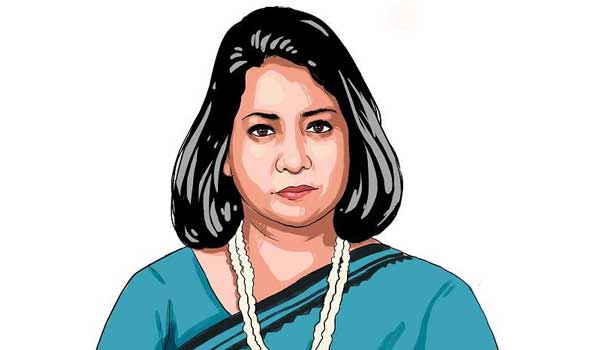
Govt must control inflation, increase private investments to tackle poverty – Fahmida Khatun
Urgent measures must be taken to control inflation, though the government should have taken steps to control it way earlier. A World Bank projection states that extreme poor will increase by 5 lakh and moderate poor by 8.4 lakh within FY24. These numbers are deeply troubling.
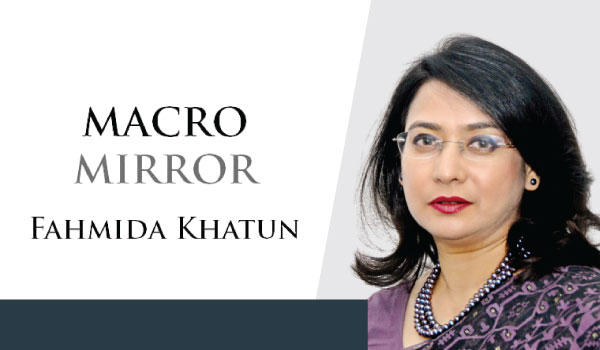
How can Bangladesh manage its external debt? – Fahmida Khatun
Recently, Bangladesh’s external debt situation has become a topic of discussion—and for several reasons. While Bangladesh’s external debt is deemed comfortable according to the IMF’s Debt Sustainability Report, there are concerns about the significant increase in debt servicing liabilities.
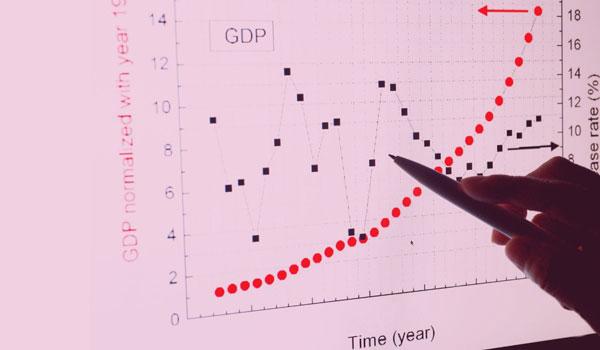
A snapshot of macroeconomic correlates
The national budget for FY2024-25 (FY25) will be the first budget prepared by the incumbent government. It will also be prepared under new leadership at the Ministry of Finance.

Why is WTO’s 13th Ministerial Conference important for Bangladesh? – Fahmida Khatun
The 13th Ministerial Conference (MC13) of the World Trade Organization (WTO) held in Abu Dhabi from February 26 to March 2 has significance for Bangladesh.

Time for exporters to shed the cocoon of cash incentives – Fahmida Khatun
In a move to adapt to changing global economic dynamics, policymakers in Bangladesh recently announced significant changes to the country’s cash assistance rates for various export items.

সুশাসন প্রতিষ্ঠা করতে না পারলে অর্থনৈতিক সমস্যা দূর করা যাবে না – ফাহমিদা খাতুন
দ্বাদশ জাতীয় সংসদ নির্বাচনের পর দেশে নতুন যে সরকার এসেছে তার জন্য বেশকিছু চ্যালেঞ্জ রয়েছে। বিগত বছরগুলোয় মূল্যস্ফীতির ফলে দেশের অর্থনীতিতে যে অস্থিতিশীলতা তৈরি হয়েছে, সেটাকে নিয়ন্ত্রণে আনার পাশাপাশি রাজস্ব বৃদ্ধির লক্ষ্যে ঋণখেলাপিদের থেকে ঋণ আদায় করা, ব্যাংকিং খাতে যেসব অনিয়ম চলছে তা বন্ধে কাজ করা নতুন সরকারের জন্য বড় চ্যালেঞ্জ হবে বলে আমি মনে করি।
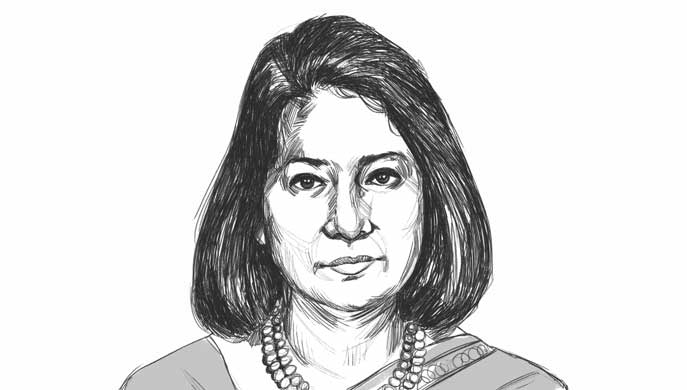
Last year’s macroeconomic strains showing no signs of letting up – Fahmida Khatun
The strains on the macroeconomic landscape in 2023 have only intensified over the preceding year, and there is no evidence of any improvement in the prevailing conditions in the new year 2024.
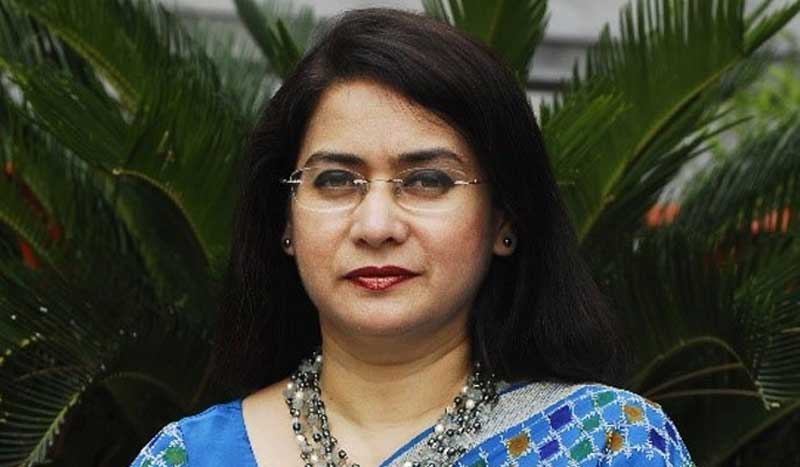
হয়ে উঠুন বন্ধু – ফাহমিদা খাতুন
সামাজিক যোগাযোগমাধ্যমে অনেক সময় চলে যায়। মেধাবিকাশের ক্ষেত্রে তা অন্তরায়। মেধা কোনো সৃজনশীল, সৃষ্টিশীল, উদ্ভাবনমূলক কাজে ব্যবহারের সুযোগ থাকে না। চিন্তা করার সৃজনশীল মনন তৈরি হয় না।

Effective market management could contribute to a moderated inflation rate – Dr Fahmida Khatun
Addressing the challenges of the economy requires a comprehensive approach, encompassing improved fiscal management, timely project implementation, enhanced accountability, and an environment conducive to private sector growth

The biggest risks facing our world in 2024 – Fahmida Khatun
The World Economic Forum (WEF) just released its annual Global Risks Report 2024, ahead of its annual meeting in Davos, Switzerland. The report presents a sobering assessment of current and future socio-economic and political situations, signalling a global risk landscape that is gradually eroding human development progress.

